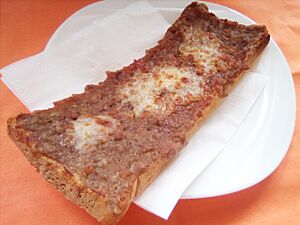Princess (food) facts for kids

Princesses (in Bulgarian: Принцеси) are super popular open-faced sandwiches from Bulgarian cuisine. They are baked and often eaten for breakfast or as a quick snack. Imagine a slice of bread topped with tasty minced meat! People sometimes call one sandwich a "princess" and many sandwiches "princesses."
When made at home, princesses are usually the size of a regular bread slice and baked in an oven. But if you buy them as fast food, they can be much longer. These longer ones are made from a whole loaf of bread sliced lengthwise and might even be cooked on a charcoal barbecue grill.
Sometimes, people add kashkaval (a type of yellow cheese) on top of the sandwich. You can also add toppings like mayo, ketchup, mustard, or a special Bulgarian sauce called ljutenica. It all depends on what you like!
Other open-faced baked sandwiches are also sometimes called princesses in Bulgaria. These can have different toppings like eggs and sirene (a white cheese), or just kashkaval, or kashkaval with ham.
It's also interesting to know that some people call the meat princesses, especially the long ones cooked on a barbecue, Strandjanki.
Contents
How to Make Princesses
Making princesses is quite simple! Here's how it's usually done:
Ingredients You'll Need
- Minced meat (often a mix of beef and pork)
- One or more eggs
- An onion
- Slices of bread
- Kashkaval (optional, for cheese lovers!)
- A little bit of butter or margarine (optional, for extra juiciness)
- Salt
- Savory (a herb)
- Ground black pepper
- Other spices like thyme, cumin, coriander, or ginger (these can change depending on the recipe)
Simple Steps to Prepare
First, put the minced meat in a bowl. Add eggs and finely chopped onion. Then, sprinkle in black pepper, savory, and other spices like thyme or cumin. Mix everything together really well.
If the meat mixture feels too firm, you can add another egg to make it softer. This makes it easier to spread.
Next, you can spread a small amount of butter or margarine on your bread slices. This makes the princesses extra juicy and delicious! Then, spread the meat mixture evenly over the bread slices.
Finally, place the sandwiches in an oven that's heated to a medium or high temperature. Bake them for about 5 to 10 minutes. They are ready when the meat looks golden brown and is cooked all the way through. Serve them hot!
What to Serve with Princesses
Many people like to eat meat princesses with Sharena sol (which means "colorful salt"). This is a special Bulgarian spice mix that has salt, savory, and paprika. You can also add spreads like mayo, ketchup, or mustard, usually squeezed from a bottle. Different kinds of ljutenica are also a popular choice with these meat sandwiches.
Other types of princesses, like those with eggs and cheese, are made in a similar way. However, people usually don't add extra spreads to these non-meat versions.
The Story of Princesses
Princess sandwiches are a unique Bulgarian food. No nearby countries have anything quite like them! They became popular during the 1960s. People think they were invented as a smart way to make a filling meal without using too much expensive meat. Even if they don't always look fancy, they are super tasty and easy to make, which is why they became so loved across the country.
There are different ideas about how the name "princess" or "stranjanka" came about. There's even a funny old story about a king and a girl who fed his hungry army with these sandwiches. The girl supposedly asked to be made a princess if she succeeded!
However, the real reason for the name is different. Back in the day, it was common in Bulgaria to name food products after places, like towns or mountains. For example, there was "Liulin" marzipan or "Vitosha" kashkaval. Sometimes, foods were named after important events.
In this case, these meat sandwiches were first given a grand name: "Thracian princess." This name was a nod to the discovery of an ancient burial mound called the Mogilan mound in the city of Vratsa in 1965–66. But people didn't really use the long name. Instead, they shortened it to just "a princess," and that's the name that stuck!
 | May Edward Chinn |
 | Rebecca Cole |
 | Alexa Canady |
 | Dorothy Lavinia Brown |

